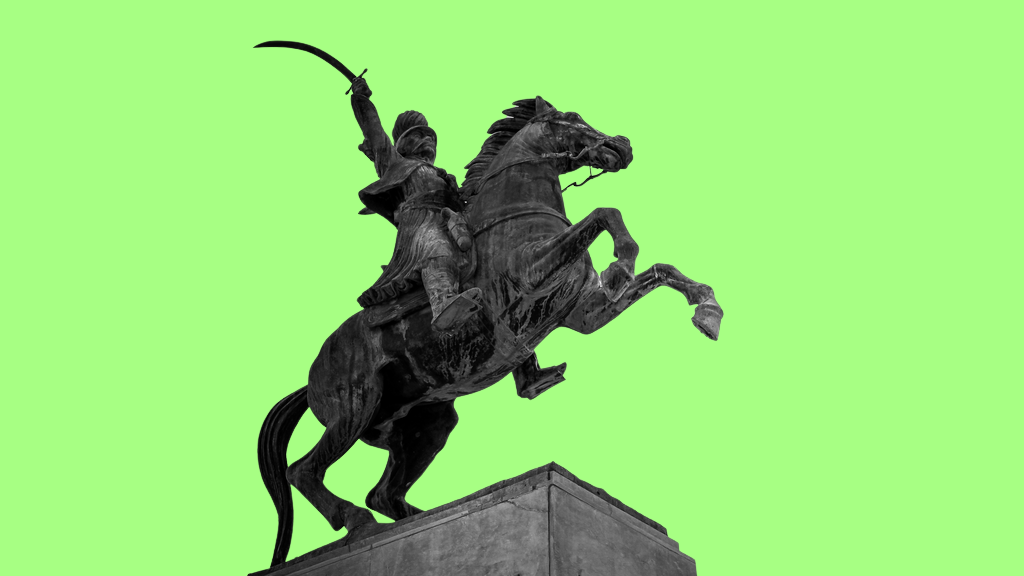Nick Pearce is Professor of Public Policy and Director of the Institute for Policy Research (IPR) at the University of Bath.
Six hundred leagues are no great distance, now that liberalism navigates with full sails and is making the tour of the world.
- Gazette de France, 26 May 1821 [1].
This month marks the 200th anniversary of the Declaration of Independence and proclamation of the new constitution of the fledgling Greek nation state at Epidavros on the Eastern coast of the Peloponnese. In January 1822, in the village of Piada, not far from the ancient amphitheatre of Epidavros, the new Greek National Assembly declared:
We, descendants of the wise and noble peoples of Hellas, we who are the contemporaries of the enlightened and civilised nations of Europe, we who behold the advantages which they enjoy under the protection of the impenetrable aegis of the law, find it no longer possible to suffer without cowardice and self-contempt the cruel yoke of the Ottoman power which has weighed upon us for more than four centuries, - a power which does not listen to reason and knows no other law than its own will, which orders and disposes everything despotically and according to its caprice. After this prolonged slavery we have determined to take arms to avenge ourselves and our country against a frightful tyranny, iniquitous in its very essence, - an unexampled despotism to which no other rule can be compared.
Last year’s celebrations of the bicentenary of the start of the Greek revolution, which eventually gave birth to modern Greece, were muted by Covid. But this formative moment in modern European history has been commemorated in important new works of scholarship, most notably Mark Mazower’s, The Greek Revolution: 1821 and the Making of Modern Europe. For English speakers, Mazower’s book - likely to become an instant classic on the subject - can be read alongside two other important recent works by Roderick Beaton, Greece: Biography of a Modern Nation and The Greeks: A Global History, and a collection of essays by predominantly Greek scholars, The Greek Revolution: A Critical Dictionary, edited by Paschalis M.Kitromilides and Constantinos Tsoulakas.
Mazower’s book is a gripping history, charting with admirable dexterity and narrative verve the twists and turns of the Greek Revolution as it progressed from the uprisings of 1821, through subsequent division, civil war and military defeats, to eventual triumph after the allied navies of Great Britain, France and Russia sunk the Ottoman fleet at the Battle of Navarino in 1827. It is a complex, dramatic history, powerfully told. But Mazower’s account is not merely a narrative one. It is rich in historical theory and it makes important arguments about the centrality of the birth of the Greek state to modern European and international history.
Mazower argues that, uniquely amongst the European revolutions of the late eighteenth and early nineteenth centuries, the Greek revolution was characterised by the national principle, an uprising by a people claiming nationhood and guided by the belief that ‘nations would not be governed by foreigners’ - a fact which helps explain why it was so widespread, sustained and violent, as well as ultimately successful. In this it laid the ground for later national revolutions against European empires and dynasties that gave shape to the world in which we live today. It also prefigured the international order of nation states. The Great Power conferences that eventually settled Greece’s fate also set the template for a rudimentary international system that became the League of Nations and the United Nations in the twentieth century. The origins of both modern nationalism and the society of states may thus be found co-joined in the story of Greece in 1821.
Mazower eschews nationalist romanticism and origin myths. The history of the Greek revolution is a bloody story of butchery, deceit and despoilation, with episodes of courage, astonishing fortitude and considerable luck thrown in for good measure. The ‘watchwords of the new order’, he argues, were ‘nation, faith, capitalism and constitutional representation’ [2]. He situates the Greek story in a wider global history of relations between the European states and the Ottoman empire, the fiscal policies and political strategies of the Porte, and the class struggles and territorial disputes of the agrarian and maritime Greek economies. His actors are enmeshed in an emerging Transatlantic public sphere of humanitarian assistance and prototypical capitalist financial speculation, as well as more familiar networks of Philhellenism. The Greek revolutionaries raised loans from newly institutionalised modes of finance and profiteering in the City of London and pressed their case in the courts of enlightened public opinion. They tabled their claims to nationhood to the poets, artists and Philhellenes of Europe and America, while on the scorched earth of the Greek mainland, the peasantry waged their struggle under the flag of the Orthodox faith and the promise of romeΪko and religious liberation.
If Mazower’s account is compelling, it raises an important issue for the historical understanding of liberalism. In recent years, it has often been argued that the conservative reaction to the American and French revolutions was responsible for the replacement of the republican, neo-Roman understanding of liberty (excavated and elaborated in seminal works by J.G.A Pocock, Quentin Skinner and Philip Pettit), with the modern liberal conception of freedom as consisting in non-interference by the state. Revolution and the upheaval of the Napoleonic wars provoked an anti-democratic turn in the political theory of liberty, which it is then argued, suffused nineteenth century liberalism. Freedom would henceforth consist, not in self-government and an absence of dependence or domination, but in an absence of state interference in the rights and property of the individual. This is the core thesis of Annelin De Dijn’s recent book, Freedom: An Unruly History, but it is also strikingly apparent in a recent interview with Quentin Skinner himself, in which he talks about his current research:
My aim is to write an account of when and why the idea of freedom as absence of subjection was so widely abandoned in favour of the view that liberty is simply absence of interference. My provisional answer to the question about when this happened is that, at least in the Anglophone tradition, it did so rather suddenly in the wake of the crisis in the American colonies after 1766, and in reaction to the revolution in France in 1789. My provisional answer to the question about why this happened is that the emergence of the liberal view of freedom was due to its counter-revolutionary power to respond to the two revolutions of the late eighteenth century, both of which had been proclaimed and legitimised by invoking the rival view that liberty consists in self-government for individuals as well as states.
It is quite apparent from reading the Greek Declaration of Independence of 1822, however, that it is replete with republican or neo-Roman arguments: the Ottoman Empire is tyrannical and its rule is despotic; it has enslaved the Greeks and subjected them to arbitrary rule; and it has denuded the Greeks of their virtues, which they must recover by taking up arms. They lay claim to their freedom, defined as national self-government. The language draws heavily on the key texts of the American and French revolutions, but it is also aimed squarely at the post-Napoleonic European powers. The Greeks are claiming their place amongst the Christian nations of Europe, they are not factional radicals, but a nation-in-arms, and so on.
Here then we see the tradition of republican liberty being passed into the national liberation movements that Mazower argues were inaugurated in Europe by the Greek revolution - not so much extinguished by nineteenth century liberalism as renewed in liberal nationalism. The same argument might indeed be extended to anti-imperialist and post-colonial political theory, as Manjeet K. Ramgotra has argued. Post-colonial states were founded in republican arguments for national emancipation, drawing on but also extending and enriching these with non-Western sources of thought and practice. Drawing a line between republican liberty and modern liberalism at the end of the nineteenth century thus perpetuates intellectual and historiographical divisions between West and non-West.
It is worth noting too that a capacious understanding of liberalism as an ideology - as pioneered in the work of Michael Freeden - also resists the logic of simply dividing liberalism and freedom as non-interference from republican liberty. Although the latter certainly embodies a more radical, civic and democratic understanding of freedom, there are ‘definite, discernible continuities between the traditions’, as Pettit has put it, and these continuities have been embodied particularly in social liberal and progressive political projects.
It is therefore useful, perhaps, to use Mazower’s history of the Greek Revolution, not just as a re-reading of the events of the 1820s and their place in European history, but as a prompt for renewing the study of the lineages of republican theories, beyond both the Anglophone and European worlds and the revolutionary era of the end of the eighteenth century.
[1] Cited in Mark Mazower, The Greek Revolution: 1821 and the Making of Europe, Allen Lane, 2021, p. 215.
[2] Ibid p. xxi
All articles posted on this blog give the views of the author(s), and not the position of the IPR, nor of the University of Bath.
Respond




